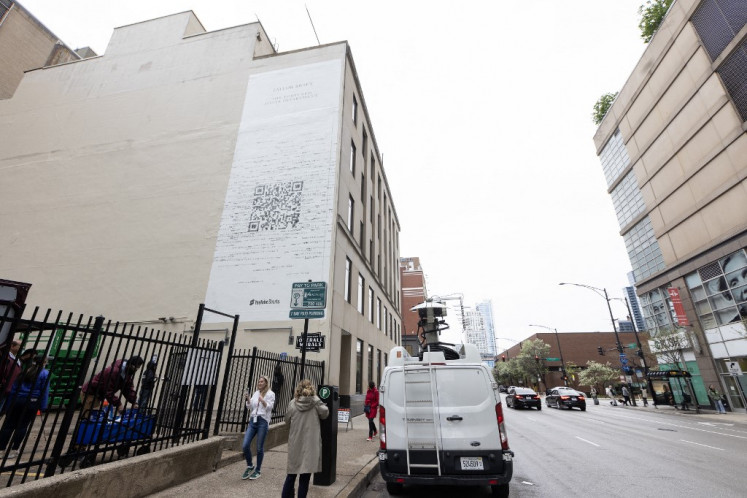Sivan blooms with iridescent 'nostalgia' in sophomore album
It goes without saying, like many pop records in recent years, Bloom is steeped in nostalgia.
Change Size
 Cover art of Troye Sivan's 'Bloom' (Troye Sivan/File)
Cover art of Troye Sivan's 'Bloom' (Troye Sivan/File)
I
t was the 11th grade, and our class was made to listen to Elton John’s “Daniel” and fill in the missing lyrics in our textbooks.
“Lord, I miss Daniel/Oh, I miss him so much,” croons John as stifled giggles wafted across the classroom. “Whew, he’s talking about his brother!” a classmate feigned a sigh of relief as the song reached the chorus, his chortle now clearly audible. Other boys joined in a chorus of laughs.
“As if a man can’t sing a love song about another man,” I muttered.
This was the early 2000s, and openly gay male pop stars were already pop icons – other than Elton John, the only prominent names were George Michael, and to some extent, Neil Tennant and Boy George.
As gay visibility continued to gain mainstream traction in the ensuing decade, more and more pop stars came out. The likes of Troye Sivan and Olly Alexander emerged somewhere between the high-camp theatrics of Adam Lambert and the stately beigeness of Sam Smith, and founded their careers on the intersection between the inventive, cutting-edge indie aesthetic and the look and swagger of a pop star.
In contrast to Alexander’s buzzing, frenetic output with the London-born Years & Years, Sivan has always opted for more low-key sonic accoutrements and inward-looking lyricism, reflective of his upbringing in “Earth's most isolated city” of Perth, Australia. His 2015 full-length debut, Blue Neighbourhood, is chock full of dreamy, synth-heavy pop nuggets replete with ruminations on love, loss and coming out as a "smalltown boy" – to quote a Bronski Beat hit.
True to its title, Bloom (2018) picks up where Blue Neighbourhood left off and amps it up a few notches. You will be hard-pressed to find a more jubilant and exhilarating pop song this year than lead single “My My My!”, while the title track goes where virtually no other pop song has gone before: a sly and poetic retelling of being on the receiving end of same-sex male intercourse.
Similarly, album opener “Seventeen” recounts the often desperate attempt for connection among gay youth, albeit neglecting the potential perils. It also plays as something of a sequel to Blue Neighbourhood’s “Heaven”, with its penultimate hook “I’m counting to fifteen” – Sivan’s age when he came out to his family.
Meanwhile, “The Good Side” and “Plum” tackle failed romance from contrasting angles: the former is as meandering and mournful as the latter is chirpy and jaunty, almost as if the break-up is a relief.
It goes without saying that like many pop records in recent years, Bloom is steeped in nostalgia: the visuals for both “My My My!” and “Bloom”, for instance, give a nod to the mainstream LGBT icons of the '80s and '90s, from George Michael and Boy George to Madonna and Annie Lennox via Michael Jackson.
Further down the tracklist, “What A Heavenly Way To Die” cops its title from The Smiths’ classic “There Is A Light That Never Goes Out”, and the gut-wrenching “Postcard” features the vocals of fellow Aussie Gordi, which faintly recalls Kate Bush’s memorable appearance on Peter Gabriel’s “Don’t Give Up”. Pining for another boy who “taste[s] like Lucky Strike” is also a stroke of genius in its use of a foregone symbol of manhood and masculinity to depict the pangs of same-sex desire, especially when emboldened with a plea like “Tell me all the ways to love you”.
It might be easy to play the cynic and dismiss Gen Z’s romanticizing the days of yore, but upon repeated listenings, deeper layers to this exercise in nostalgia unfold over the course of Bloom.
In the '80s and '90s, especially at the height of the AIDS epidemic, it would have been career suicide for a major pop star to declare themselves as anything but heterosexual, let alone be out from the get-go. By culling pop artifacts and iconographies from eras where it was really not okay to be gay and marrying them with his own artistry, Sivan is reclaiming the “gay pop star” narrative in his own way in an era when gay is not only okay, and is also a cool, hip niche to occupy.
In a banner year for pop music made by LGBT artists – cheekily dubbed as “two thousand gay teen” by denizens of the interweb – which has seen solid releases such as Hayley Kiyoko’s Expectations, Years & Years’ Palo Santo and MNEK’s Language, Sivan's Bloom stands tall thanks to its impressive counterpointing between the past and present and the personal and universal, as the best pop records do. This is best exemplified in “Dance To This”, a laid-back, sensuous jam that is concurrently an ode to domesticity, featuring modern pop’s finest vocalist, Ariana Grande, as well as closing track “Animal”, a spectral, majestic “ode to the boy I love”, as Sivan declares in the lyrics.
Sometimes, I wonder how today’s 11th graders would respond to hearing a song like “Animal”, wherein Sivan holds nothing back in expressing his love and devotion for his boyfriend: “Boy, I’ll die to care for you/You’re mine, mine, mine/Tell me who do I owe that to?” Hopefully, there would be warm smiles and gentle nods in lieu of mocking laughter and eye-rolls, an understanding and recognition that not only it is possible for a man to love another man, it’s perfectly fine to sing about it, too. (wng)
***
Fajar Zakhri is based in Jakarta and frequently writes about popular music and culture, social commentary and personal reflections on contemporary issues. He also contributes to media outlets such as Magdalene, Globetrotter and The Sympathizer. He has also been featured in a number of international publications, such as The Guardian, Thomson Reuters Foundation and Autostraddle, among others.









